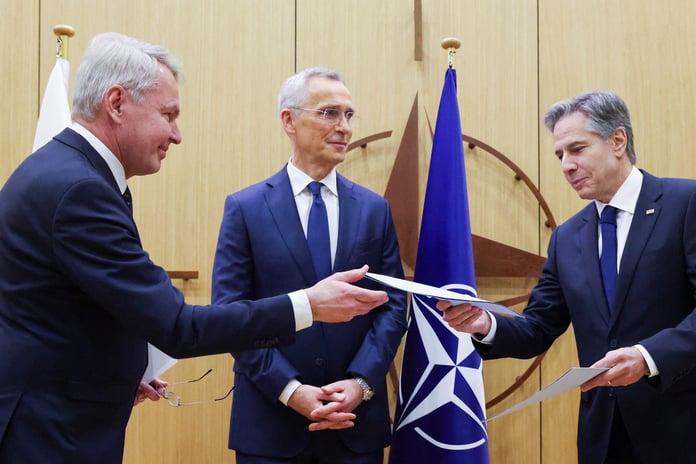In a geopolitical shift of tectonic proportions, Finland has formally joined the North Atlantic Treaty Organization (NATO), a move largely catalyzed by Russia’s ongoing aggression in Ukraine. This development has not only doubled NATO’s border with Russia but has also sent ripples through the international community, affecting strategies and alliances.
Finland’s decision to join NATO was not an overnight affair. The country had a center-left government when Russia invaded Ukraine in 2022. However, the reality of Russian aggression and President Vladimir Putin’s expansionist policies led Finland to reconsider its stance on NATO membership. A year later, under a new center-right government, Finland’s approach to supporting Ukraine and resisting Russia’s invasion has remained steadfast. In a recent conversation with Finnish Foreign Minister Elina Valtonen, she emphasized that Finland’s NATO membership has made the country feel more secure and that they take pride in being net contributors to NATO, meeting the 2% GDP target for defense spending with ease.
The Finnish government’s decision has been met with broad public support, debunking Russian narratives that portray NATO as a threat. Valtonen pointed out that NATO doesn’t enlarge itself; it’s the people in democratic societies who vote to join the alliance. She also highlighted that aiding Ukraine is not charity but a stand for European and Western values. The minister warned that letting go of Ukraine would empower Russia, a scenario detrimental to all, especially neighboring countries.
Finland’s NATO membership has been the fastest in the alliance’s history, according to Jens Stoltenberg, the head of NATO. He hailed the move as beneficial for Finland’s security, Nordic security, and NATO as a whole. Finland’s President Sauli Väinämö Niinistö also emphasized that their membership was not targeted against anyone and that the country looks forward to Sweden joining as the 32nd member. However, Sweden’s accession is still pending due to objections from NATO members Turkey and Hungary, according to Al Jazeera.
Finland’s NATO membership has also sparked discussions among other neutral European countries about their own security policies. Switzerland and Austria, for example, have maintained a policy of neutrality but are now facing public debates about whether they should reconsider their positions in light of the changing geopolitical landscape. While these nations have not yet indicated a shift in policy, the Finnish example has certainly ignited conversations about the future of European security.
The implications of Finland’s NATO membership are far-reaching. Russia has long opposed NATO enlargement, claiming it compromises its security. In response to Finland’s membership, Russian officials have promised to boost military capacity in their western and northwestern regions. Russian Defence Minister Sergei Shoigu stated that Finland’s accession creates the risks of a significant expansion of the conflict in Ukraine but would not affect the outcome of what Russia calls its “special military operation” in Ukraine.
The Finnish move also has implications for the United States and its role in NATO, according to Secretary General of NATO Jens Stoltenberg. The U.S. has been a strong advocate for countries meeting their defense spending commitments to the alliance. Finland’s quick achievement of the 2% GDP target for defense spending is seen as a positive development in Washington. It not only strengthens the alliance but also sends a message to other NATO members about the importance of meeting their financial commitments for collective security.
On the Russian front, Moscow’s reaction to Finland’s NATO membership has been one of strong disapproval, but it has stopped short of taking any drastic measures. Russian officials have warned that the move complicates the security situation in the region and have promised to take “appropriate measures” in response. However, it remains to be seen what form these measures will take and whether they will significantly alter the dynamics of Russia’s relationships with NATO and its individual member states.
Another angle to consider is the impact of Finland’s decision on the ongoing conflict in Ukraine. Finland has been a vocal supporter of Ukraine’s sovereignty and has condemned Russia’s actions. By joining NATO, Finland is likely to play a more active role in supporting Ukraine, both diplomatically and potentially militarily. This could involve increased financial aid, provision of military equipment, or even participation in peacekeeping efforts, should the situation call for it. The move is seen as a morale booster for Ukraine, which has been seeking closer ties with Western institutions as it continues to face Russian aggression.
The move is a strategic and political blow to Putin, but the alliance says it poses no harm to Moscow. Months after Putin’s invasion of Ukraine sent a shiver of fear through Moscow’s neighbors, Finland’s leaders signaled they wanted to join the alliance. The move is considered to increase the security of Finland and represents a major change in Europe’s security landscape. Finland adopted neutrality after its defeat by the Soviets in World War II, but the current geopolitical climate has necessitated a change in stance.
Finland’s NATO membership is a monumental development in the geopolitical landscape, influenced by Russia’s actions in Ukraine. It signifies a united stand by democratic nations against authoritarian aggression and underscores the importance of collective security in today’s increasingly volatile world.


